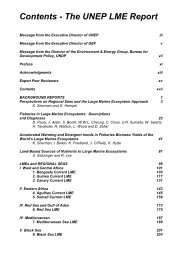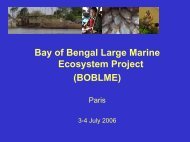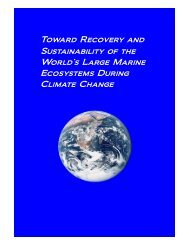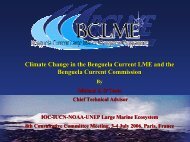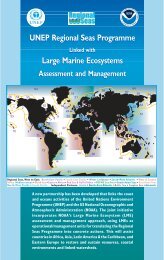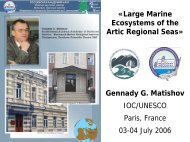Sustaining the World's Large Marine Ecosystems
Sustaining the World's Large Marine Ecosystems
Sustaining the World's Large Marine Ecosystems
Create successful ePaper yourself
Turn your PDF publications into a flip-book with our unique Google optimized e-Paper software.
Since <strong>the</strong> 1940s, <strong>the</strong> accelerated industrialization and exploitation of natural<br />
resources in <strong>the</strong> Baltic Sea have resulted in <strong>the</strong> deterioration and degradation of<br />
this vulnerable marine ecosystem. Today, close to 90 million people inhabit <strong>the</strong><br />
Baltic Sea drainage basin, and <strong>the</strong>ir activities impact and change <strong>the</strong> Baltic Sea<br />
environment. The Baltic Sea LME is among <strong>the</strong> most scientifically investigated<br />
sea areas in <strong>the</strong> world. Its environmental conditions, <strong>the</strong> possible impacts of<br />
human activities and <strong>the</strong> major threats to <strong>the</strong> ecosystem have been known and<br />
well documented for a long time. The key environmental issues and threats to<br />
<strong>the</strong> Baltic Sea ecosystem are: eutrophication, overfishing, chemical pollution,<br />
changes in biodiversity and, especially in recent years, climate change.<br />
International Management and Advisory Systems<br />
In <strong>the</strong> Baltic Sea LME, fisheries management (e.g. <strong>the</strong> setting of total allowable<br />
catches and quotas) was conducted between 1973 and 2005 by <strong>the</strong> International<br />
Baltic Sea Fishery Commission (IBSFC), situated in Warsaw, Poland. In 2004,<br />
with <strong>the</strong> accession to <strong>the</strong> European Union (EU) of Estonia, Latvia, Lithuania and<br />
Poland, <strong>the</strong> EU, via <strong>the</strong> European Commission, and Russia began managing<br />
Baltic Sea fisheries. The management of environmental issues (e.g. pollution<br />
and biodiversity conservation) is conducted by <strong>the</strong> Helsinki Commission–Baltic<br />
<strong>Marine</strong> Environment Protection Commission (HELCOM), in Helsinki, Finland).<br />
The Contracting Parties of <strong>the</strong>se commissions are <strong>the</strong> 8 Baltic EU countries<br />
(Denmark, Estonia, Finland, Germany, Latvia, Lithuania, Poland, and Sweden),<br />
and <strong>the</strong> Russian Federation. These management bodies receive <strong>the</strong> best<br />
available and politically neutral scientific information and advice for regulatory<br />
purposes from <strong>the</strong> International Council for <strong>the</strong> Exploration of <strong>the</strong> Sea (ICES),<br />
situated in Copenhagen, Denmark. ICES utilizes a consensus-based peerreviewed<br />
advisory process with national representation. Fundamental inputs are<br />
<strong>the</strong> annually compiled reports of its numerous oceanographic, environmental and<br />
fisheries working groups that address key practical tasks as required. HELCOM<br />
and <strong>the</strong> European Commission toge<strong>the</strong>r with <strong>the</strong>ir member states use <strong>the</strong> ICES<br />
advice to make management decisions. However, <strong>the</strong>y are not obliged to act in<br />
accordance with <strong>the</strong> advice provided to <strong>the</strong>m.<br />
In response to calls from stakeholders in <strong>the</strong> fisheries sector who wanted to be<br />
more involved in fisheries management, <strong>the</strong> EU in 2006 created <strong>the</strong> Baltic Sea<br />
Regional Advisory Council (BS RAC) in Copenhagen, Denmark. Similar advisory<br />
councils have been established in six o<strong>the</strong>r EU regions. The main aim of <strong>the</strong> BS<br />
RAC is to prepare and provide stakeholder advice on <strong>the</strong> management of Baltic<br />
Sea fisheries in order to support <strong>the</strong> implementation of <strong>the</strong> EU’s Common<br />
Fisheries Policy. The BS RAC meets frequently with ICES for cooperation and<br />
mutual updates on fisheries and science-based activities.<br />
The last two decades have seen considerable political and socioeconomic<br />
changes in <strong>the</strong> Baltic Sea area. A major change was <strong>the</strong> collapse of <strong>the</strong> Soviet<br />
66



